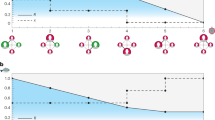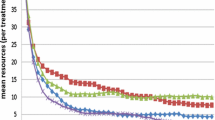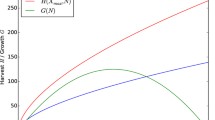Abstract
There is conflicting evidence about whether abundant resources are indeed a blessing or a curse. We make use of specially designed economic experiments to investigate how resource abundance affects cooperation in the absence or presence of regulatory institutions. We observe that in the absence of regulatory institutions, there is less cooperation in groups with access to large resource pools than in groups with access to small resource pools. However, if regulatory institutions are present, we show that there is more cooperation in groups with access to large resource pools than in groups with access to small resource pools. Our findings also reveal that resource users are more willing to regulate access to abundant than to small resource pools. These findings provide causal evidence for the “paradox of plenty” and identify the causes for the pitfalls and potentials of resource wealth.






Similar content being viewed by others
Notes
Our results are very much in line with the seminal argument in Demsetz (1967): institutions internalize externalities, such as property rights, when the benefits are large enough to justify the costs.
While there are several proposed explanations (Sachs and Warner 2001), we chose to focus on the crowding-in variant for at least four reasons. First, there is recent evidence that there are significant correlations between cooperation/conflict/corruption measures and economic outcomes (Ross 2001; Collier and Hoeffler 2005; Vicente 2010). Second, there is also evidence for links between the institutional environment and economic outcomes (Bohn and Deacon 2000; Acemoglu et al. 2001; Mehlum et al. 2006; Robinson et al. 2006; Boschini et al. 2007), which suggests a crucial role of cooperation/conflict/corruption as these behaviors are likely to be related to the institutional environment (Svensson 2005; Mocan 2008). Third, the crowding-in variant seems to be less contested than many other variants such as the Dutch Disease (Corden and Neary 1982; Sachs and Warner 2001; Mehlum et al. 2006). Fourth, cooperation/conflict can be accurately and objectively identified in a behavioral experiment.
References
Acemoglu, D., Johnson, S., & Robinson, J. A. (2001). The colonial origins of comparative development: An empirical investigation. American Economic Review, 91(5), 1369–1401.
Alexeev, M., & Conrad, R. (2009). The elusive curse of oil. Review of Economics and Statistics, 91(3), 586–598.
Al-Ubaydli, O., McCabe, K., & Twieg, P. (2014). Can more be less? An experimental test of the resource curse. Journal of Experimental Political Science, 1(1), 39–58.
Andersen, S., Ertac, S., Gneezy, U., Hoffman, M., & List, J. A. (2011). Stakes matter in ultimatum games. American Economic Review, 101(7), 3427–3439.
Andreoni, J. (1995). Warm-glow versus cold-prickle: The effects of positive and negative framing on cooperation in experiments. Quarterly Journal of Economics, 110(1), 1–21.
Andreoni, J., & Gee, L. (2012). Gun for hire: Delegated enforcement and peer punishment in public goods provision. Journal of Public Economics, 96(11–12), 1036–1046.
Auty, R. M. (2001). The political economy of resource-driven growth. European Economic Review, 45(4–6), 839–846.
Bohn, H., & Deacon, R. T. (2000). Ownership risk, investment, and the use of natural resources. American Economic Review, 90(3), 526–549.
Boschini, A. D., Pettersson, J., & Roine, J. (2007). Resource curse or not: A question of appropriability. Scandinavian Journal of Economics, 109(3), 593–617.
Brewer, M. B., & Kramer, R. M. (1986). Choice behavior in social dilemmas: Effects of social identity, group size, and decision framing. Journal of Personality and Social Psychology, 50(3), 543–549.
Brunnschweiler, C. N., & Bulte, E. H. (2008). Linking natural resources to slow growth and more conflict. Science, 320, 616.
Camerer, C. F., & Hogarth, R. M. (1999). The effects of financial incentives in experiments: A review and capital-labor-production framework. Journal of Risk and Uncertainty, 19(1), 7–42.
Cameron, L. A. (1999). Raising the stakes in the ultimatum game: Experimental evidence from Indonesia. Economic Inquiry, 37(1), 47–59.
Carpenter, J., Verhoogen, E., & Burks, S. (2005). The effect of stakes in distribution experiments. Economics Letters, 86(3), 393–398.
Cason, T. N., & Khan, F. U. (1999). “A laboratory study of voluntary public goods provision with imperfect monitoring and communication. Journal of Development Economics, 58(2), 533–552.
Charness, G. (2000). Responsibility and effort in an experimental labor market. Journal of Economic Behavior & Organization, 42(3), 375–384.
Cherry, T. L., Frykblom, P., & Shogren, J. F. (2002). Hardnose the dictator. American Economic Review, 92(4), 1218–1221.
Clark, K., & Sefton, M. (2001). The sequential prisoner’s dilemma: evidence on reciprocation. The Economic Journal, 111(468), 51–68.
Collier, P., & Hoeffler, A. (2005). Resource rents, governance, and conflict. Journal of Conflict Resolution, 49(4), 625.
Corden, W. M., & Neary, J. P. (1982). Booming sector and de-industrialisation in a small open economy. The Economic Journal, 92(368), 825–848.
Cox, J. C., Ostrom, E., Sadiraj, V., & Walker, J. M. (2013). Provision versus appropriation in symmetric and asymmetric social dilemmas. Southern Economic Journal, 79(3), 496–512.
Demsetz, H. (1967). Towards a theory of property rights. The American Economic Review, 57(2), 347–359.
Dufwenberg, M., Gächter, S., & Hennig-Schmidt, H. (2011). The framing of games and the psychology of play. Games and Economic Behavior, 73(2), 459–478.
Fehr, E., & Leibbrandt, A. (2011). A field study on cooperativeness and impatience in the tragedy of the commons. Journal of Public Economics, 95, 1144–1155.
Fischbacher, U. (2007). z-Tree: Zurich toolbox for ready-made economic experiments. Experimental Economics, 10(2), 171–178.
Forsythe, R., Horowitz, J. L., Savin, N. E., & Sefton, M. (1994). Fairness in simple bargaining experiments. Games and Economic behavior, 6(3), 347–369.
Gneezy, U., & Rustichini, A. (2000). A Fine is a Price. The Journal of Legal Studies, 29, 1–17.
Gylfason, T., Herbertsson, T. T., & Zoega, G. (1999). A mixed blessing: Natural resources and economic growth. Macroeconomic Dynamics, 3(02), 204–225.
Hodler, R. (2006). The curse of natural resources in fractionalized countries. European Economic Review, 50(6), 1367–1386.
Hoffman, E., McCabe, K. A., & Smith, V. L. (1996). On expectations and the monetary stakes in ultimatum games. International Journal of Game Theory, 25(3), 289–301.
Johansson-Stenman, O., Mahmud, M., & Martinsson, P. (2005). Does stake size matter in trust games? Economics Letters, 88(3), 365–369.
Kocher, M. G., Martinsson, P., & Visser, M. (2008). Does stake size matter for cooperation and punishment? Economics Letters, 99(3), 508–511.
Kosfeld, M., Okada, A., & Riedl, A. (2009). Institution formation in public goods games. American Economic Review, 99(4), 1335–1355.
Leibbrandt, A., Maitra, P., & Neelim, A. (2015). On the redistribution of wealth in a developing country: Experimental evidence on stake and framing effects. Journal of Economic Behavior and Organization, 118, 360–371.
Marwell, G., & Ames, R. E. (1980). Experiments on the provision of public goods II provision points, stakes, experience, and the free-rider problem. American Journal of Sociology, 85(4), 926–937.
Mehlum, H., Moene, K., & Torvik, R. (2006). Institutions and the resource curse. The Economic Journal, 116(508), 1–20.
Mocan, N. (2008). What determines corruption? International evidence from microdata. Economic Inquiry, 46(4), 493–510.
Nikiforakis, N. (2008). “Punishment and counter-punishment in public good games: Can we really govern ourselves? Journal of Public Economics, 92(1), 91–112.
Norman, C. S. (2009). Rule of law and the resource curse: abundance versus intensity. Environmental & Resource Economics, 43(2), 183–207.
Ostrom, E., Gardner, J. R., & Walker, J. (1994). Rules, games, and common-pool resources. Ann Arbor: University of Michigan Press.
Ostrom, E., Walker, J., & Gardner, R. (1992). Covenants with and without a sword: Self-governance is possible. The American Political Science Review, 86(2), 404–417.
Parco, J. E., Rapoport, A., & Stein, W. E. (2002). Effects of financial incentives on the breakdown of mutual trust. Psychological Science, 13(3), 292.
Rapoport, A., Stein, W. E., Parco, J. E., & Nicholas, T. E. (2003). Equilibrium play and adaptive learning in the three-person centipede game. Games and Economic Behavior, 43, 239–265.
Robinson, J. A., Torvik, R., & Verdier, T. (2006). Political foundations of the resource curse. Journal of Development Economics, 79(2), 447–468.
Ross, M. L. (2001). Does oil hinder democracy? World Politics, 53(3), 325–361.
Sachs, J.D., & Warner, A. M. (1995). Natural resource abundance and economic growth. In: NBER Working Papers. National Bureau of Economic Research.
Sachs, J. D., & Warner, A. M. (2001). The curse of natural resources. European Economic Review, 45(4–6), 827–838.
Sefton, M., Shupp, R., & Walker, J. M. (2007). The effect of rewards and sanctions in provision of public goods. Economic Inquiry, 45(4), 671–690.
Slonim, R., & Roth, A. E. (1998). Learning in high stakes ultimatum games: An experiment in the Slovak Republic. Econometrica, 66(3), 569–596.
Svensson, J. (2005). Eight questions about corruption. The Journal of Economic Perspectives, 19(3), 19–42.
Tornell, A., & Lane, P. R. (1999). The voracity effect. American Economic Review, 89(1), 22–46.
Torvik, R. (2002). Natural resources, rent seeking and welfare. Journal of Development Economics, 67(2), 455–470.
Tyran, J. R., & Feld, L. P. (2006). Achieving compliance when legal sanctions are non-deterrent. The Scandinavian Journal of Economics, 108(1), 135–156.
van der Ploeg, F. (2011). Natural resources: Curse or blessing? Journal of Economic Literature, 49(2), 366–420.
van der Ploeg, F., & Rohner, D. (2012). War and natural resource exploitation. European Economic Review, 56(8), 1714–1729.
Vicente, P. C. (2010). Does oil corrupt? Evidence from a natural experiment in West Africa. Journal of Development Economics, 92(1), 28–38.
Walker, J. M., Gardner, R., Herr, A., & Ostrom, E. (2001). Collective choice in the commons: Experimental results on proposed allocation rules and votes. The Economic Journal, 110(460), 212–234.
Wick, K., & Bulte, E. (2009). The curse of natural resources. Annual Review of Resource Economics, 1(1), 139–156.
Author information
Authors and Affiliations
Corresponding author
Rights and permissions
About this article
Cite this article
Leibbrandt, A., Lynham, J. Does the paradox of plenty exist? Experimental evidence on the curse of resource abundance. Exp Econ 21, 337–354 (2018). https://doi.org/10.1007/s10683-017-9539-y
Received:
Revised:
Accepted:
Published:
Issue Date:
DOI: https://doi.org/10.1007/s10683-017-9539-y




